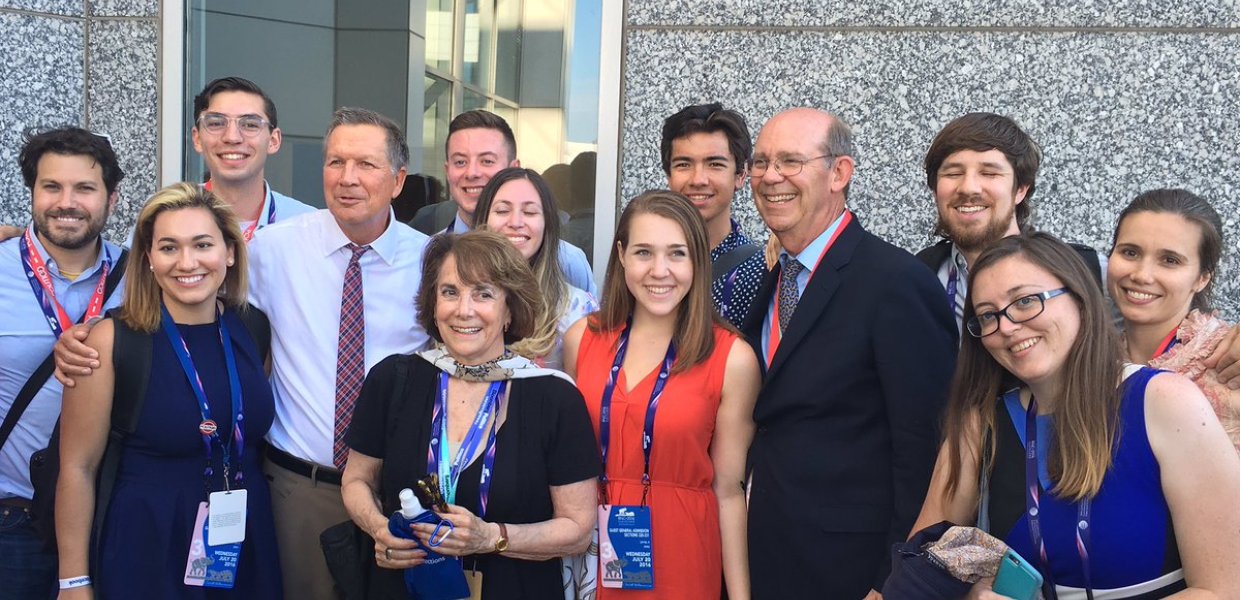As the national media converges on Cleveland and Philadelphia to cover the Republican and Democratic National Conventions respectively, a group of USC journalism students is there as well, flexing newly developed reporting chops at the culminating events of an eventful nomination cycle.
“The big goals are to give them really good reporting experience, get them to better understand the political system and political coverage,” said Laura Davis, assistant professor of professional practice in journalism at USC Annenberg. Her class, JOUR490: Covering the 2016 Election and the Democratic & Republican Conventions, was created specifically to coincide with the conventions this summer.
The trips were organized along with Geoffrey Cowan, Ev Boyle and Susan Goelz of the USC Annenberg Center on Communication Leadership & Policy (CCLP). Funding was provided in part through a donation from Rebecca Donatelli, USC alumna and director of Campaign Solutions, who served as the chief Internet consultant to both of Senator John McCain’s presidential races, and was the first person to raise political money on the Internet.
Access to this unique experience was limited to six students from any USC program. The only requirement was that the students be passionate about politics, journalism, and political communication.
Sarah Collins (B.A. Broadcast Journalism and Political Science ‘17) jumped at the opportunity.
“I knew it would be the chance of a lifetime,” Collins said. “Not only to go to the conventions but also to go this time around, during this unprecedented election cycle.”
Rachel Chiu (B.A. Political Science and Communication ‘19) agreed.
“I'm excited to rub shoulders with some of the big names in politics and media during the conventions,” said Chiu. “I really believe that these conventions will be absolutely historic and unique.”
The group is rounded out by students from a range of USC programs: Kate Guarino (B.A. Print and Digital Journalism ‘17); Tiana Lowe (B.S. Economics and Mathematics ‘18); Matt Tinoco (M.Pd Public Diplomacy); and Hannah Vega (B.A. Broadcast and Digital Journalism ‘17). They will be joined at the conventions by students from the Annenberg School of Communication at the University of Pennsylvania, where professor David Eisenhower has been taking students to the conventions every four years since 2000.
Leading up to the trip, Davis instructed the class to pay close attention to the media’s coverage of the campaign so far.
“Trump has obviously been a big storyline, and the first woman candidate—how did the media handle that?” Davis said. “You know there's a lot of interesting questions this election cycle.”
Only a handful of university students will be at the conventions, but the student reporters are not looking to compete with the likes of the Washington Post so much as to complement their coverage with a millennial’s perspective.
“We don't have the cell phone numbers of all the Trump's aides or Hillary's aides or whatever,” Davis explained. “The goal necessarily isn't to interview those type of people, but to get a more human sense of what the convention is, a better understanding of who the delegates are, who they're representing, who the voters are that made this historic election year.”
Scheduled events include breakfast with delegates, meetings with Senators, discussions with journalists, and a taping of The Daily Show during their stay in Philadelphia. The students will also have the opportunity to observe how the big media companies cover national events, with visits to Bloomberg and Atlantic Media.
As soon as they arrive at the conventions, the students are expected to report their experiences via Twitter, Snapchat and other social media.
“I'd like to see them doing some reporting on social, some native social media content as we're at the conventions, because they can do that as they go,” Davis said.
As millennials, the students are already well-versed in such tools, with years of experience using social media and technology for news reporting.
“That's one of the unique advantages that you guys have as young people is video, Snapchat,” Boyle told the students at a class meeting, encouraging them to utilize those tools as much as they can. “Most of the journalists there won't be adept at that.”
Other story ideas and topics to be tackled include the diversity (or lack thereof) of the delegations, millennials in politics, and how the rules of the conventions can be changed.
Their work is already drawing attention, as the students were featured in a news segment on ABC's affiliate station in Philadelphia.
While in Cleveland, the students visited nearby Youngstown in Mahoning Country, where they explored how Democratic voters have switched parties during the primaries to vote for Trump.
That was exactly the type of story that Chiu explained she hoped to cover before leaving on the trip.
“I'm hoping to interview individuals who have broken out of the mold, withheld their support for their candidate, changed their Party alliance, and so on,” Chiu said leading up to the visit.
For first-time visitors to the conventions, it’s difficult to know what will happen, even with the known presumptive nominees for each party. But students do know it will be quite an adventure.
“I am mentally preparing to expect the unexpected,” Collins said. “These two weeks will certainly be ones that the entire nation won't forget and that I will always remember.”
Davis agrees.
“I think it's such a unique experience,” she said. “I would love to see students doing this again in 2020, whether or not I'm involved. I hope that students get this opportunity every four years.”









